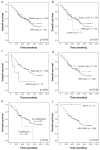BRAF, PIK3CA, and HER2 Oncogenic Alterations According to KRAS Mutation Status in Advanced Colorectal Cancers with Distant Metastasis
- PMID: 26991109
- PMCID: PMC4798471
- DOI: 10.1371/journal.pone.0151865
BRAF, PIK3CA, and HER2 Oncogenic Alterations According to KRAS Mutation Status in Advanced Colorectal Cancers with Distant Metastasis
Abstract
Background: Anti-EGFR antibody-based treatment is an important therapeutic strategy for advanced colorectal cancer (CRC); despite this, several mutations--including KRAS, BRAF, and PIK3CA mutations, and HER2 amplification--are associated with the mechanisms underlying the development of resistance to anti-EGFR therapy. The aim of our study was to investigate the frequencies and clinical implications of these genetic alterations in advanced CRC.
Methods: KRAS, BRAF, and PIK3CA mutations were determined by Cobas real-time polymerase chain reaction (PCR) in 191 advanced CRC patients with distant metastasis. Microsatellite instability (MSI) status was determined by a fragmentation assay and HER2 amplification was assessed by silver in situ hybridization. In addition, KRAS mutations were investigated by the Sanger sequencing method in 97 of 191 CRC cases.
Results: Mutations in KRAS, BRAF, and PIK3CA were found in 104 (54.5%), 6 (3.1%), and 25 (13.1%) cases of advanced CRC, respectively. MSI-high status and HER2 amplification were observed in 3 (1.6%) and 16 (8.4%) cases, respectively. PIK3CA mutations were more frequently found in KRAS mutant type (18.3%) than KRAS wild type (6.9%) (P = 0.020). In contrast, HER2 amplifications and BRAF mutations were associated with KRAS wild type with borderline significance (P = 0.052 and 0.094, respectively). In combined analyses with KRAS, BRAF and HER2 status, BRAF mutations or HER2 amplifications were associated with the worst prognosis in the wild type KRAS group (P = 0.004). When comparing the efficacy of detection methods, the results of real time PCR analysis revealed 56 of 97 (57.7%) CRC cases with KRAS mutations, whereas Sanger sequencing revealed 49 cases (50.5%).
Conclusions: KRAS mutations were found in 54.5% of advanced CRC patients. Our results support that subgrouping using PIK3CA and BRAF mutation or HER2 amplification status, in addition to KRAS mutation status, is helpful for managing advanced CRC patients.
Conflict of interest statement
Figures


References
-
- Misale S, Di Nicolantonio F, Sartore-Bianchi A, Siena S, Bardelli A (2014) Resistance to anti-EGFR therapy in colorectal cancer: from heterogeneity to convergent evolution. Cancer Discov 4: 1269–1280. 10.1158/2159-8290.CD-14-0462 - DOI - PubMed
Publication types
MeSH terms
Substances
LinkOut - more resources
Full Text Sources
Other Literature Sources
Medical
Research Materials
Miscellaneous

